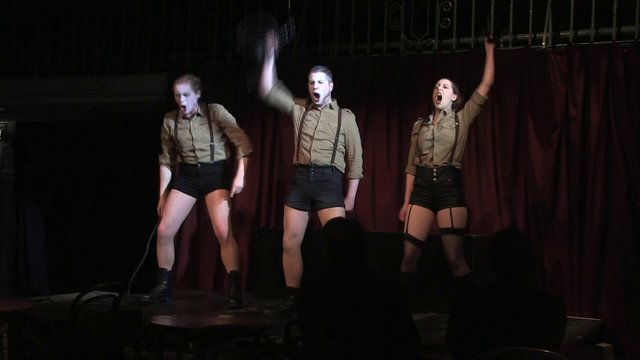Showing @ Summerhall, Edinburgh until Sun 02 Feb @ 19:30
It’s March 1933, and the streets are awash with victorious Nazis. So what better way to drown your sorrows and imagine the next fifteen years aren’t going to happen than to take a trip to Anke’s, for a night of seditious – even dangerous – entertainment?
Or at least, so goes the premise of Tightlaced Theatre‘s 1933… in which the upper floor of Summerhall has been transformed into a seedy night-time hotspot. The scruffiness suits the underbelly of Weimar Berlin night-life, and so at this level, the decision to stage an immersive production with soft lamps and characters hidden in the audience, pays off.
Where it fails is in the ability to follow the plot, in part because the seated actors are hard to hear. More importantly, given that scenes takes place simultaneously on and off stage, it can be difficult to know where to look. Concentrate for too long on an especially funny Hitler/Chaplin silent movie mash-up, and a climactic plot point can be missed.
The unfolding tale is one of familial disappointment, as both Anke’s (Danielle Farrow) children go against her wishes in polarised directions. Her son Dieter (William Mitchell) becomes an enthusiastic young Nazi whilst her daughter Merike (Hazel DuBourdieu) exposes herself on the house stage, with mother/daughter tensions stirred up by bolshy cabaret mistress Simone (Bev Wright). The arrival of the sinister Captain Voneur (Andy Corelli) foreshadows the predictably down-beat end, though the final curtain is no less poignant for this.
There are good ideas on display, but the execution is patchy; there are moments of sheer exuberance alongside palpable audience boredom. The script is over-written and often feels like a ‘paint-by-numbers’ guide to rising levels of Brown-shirt intimidation. Happily the songs have better luck, especially those in the second half. ‘Who Wants to be a Nazi’ is worryingly catchy and Merike’s big number is delivered with chic seductive power. Passion for the mood and the essence of the era is evident throughout – but a little more polish is needed.
